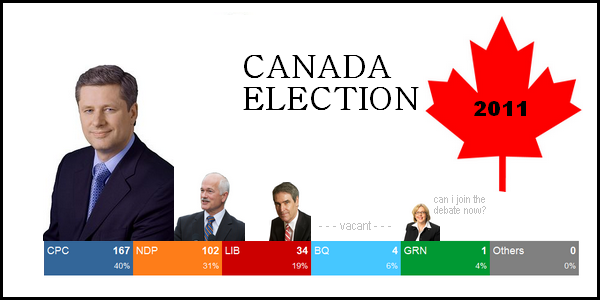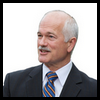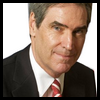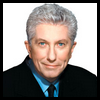
Good morning Canada, and welcome to a Conservative majority government!
This blog usually focuses on analyzing American pop culture trends, but I am just a big ole Canadian at heart and these political elections are always so fun to discuss afterwards. Of course, the 2011 election probably seems irrelevant and meaningless to any foreigners outside of Canada, especially since there aren't a lot of significant changes on the surface. Stephen Harper is still our reigning prime minister just like the past five years. The one small but notable difference is that the Conservative party now holds a majority government, which means they have more power and influence over the hot button federal issues in our country.
For those who aren't familiar with Canadian politics, here's a quick run-down of the political system: Canada is divided into 308 electoral districts based on approximate population density. Each district is represented by a Member of Parliament (MP) who must win their seat against other political parties in a popular vote. A majority government is achieved if at least 155 out of the 308 seats are represented by one predominant party; otherwise, the country holds a minority government instead. Yesterday, as of May 2nd 2011, the Conservative party took 167 seats in the most recent election, which makes Stephen Harper the triumphant leader of the majority government. He will remain as the Canadian prime minister for at least the next four years.
Unlike their American counterpart, Canadian elections are more than just a two-horse race. There are many political parties with vastly different values and platforms. The right-winged Conservative party is equivalent to the Republicans in the United States, although their platform matches more evenly with the American Democrats. The left-winged NDP party, led by Jack Layton, is the equivalent of the socialist political parties in Europe. In between the Conservatives and the NDPs are the centralist Liberal parties, which used to be the reigning champions until a recent collapse in power. There is also a Green Party, among other political affiliations in the running, although their influence on the general public is kept to a minimum.
Anyway, this article will focus on some of the more interesting recent trends that arose from the 2011 Canada election. The online Twitterverse and blogosphere was exploding with reactions over the results last night. I will attempt to be as impartial as possible in my writing (…we're doomed) and not let my political bias taint my trend analysis (doomed!)
Top Seven Trends for Canada Election 2011
1. Stephen Harper: Still Our Prime Minister
 What does it mean now that Stephen Harper has a majority government? For starters, he plans to construct a brand new multibillion state-of-the-art prison, despite the declining crime rates across the country. After all, the riots in G8 summit have shown us that the Canadian police will throw pretty much anyone behind bars! Also in danger of imprisonment are marijuana farmers, as well as anyone who infringes on digital copyright. Internet users better beware of the new online copyright laws by the Bill C-32 reform, which strives to match the stricter regulations of the American DCMA.
What does it mean now that Stephen Harper has a majority government? For starters, he plans to construct a brand new multibillion state-of-the-art prison, despite the declining crime rates across the country. After all, the riots in G8 summit have shown us that the Canadian police will throw pretty much anyone behind bars! Also in danger of imprisonment are marijuana farmers, as well as anyone who infringes on digital copyright. Internet users better beware of the new online copyright laws by the Bill C-32 reform, which strives to match the stricter regulations of the American DCMA. Meanwhile, the abolition of the Long Gun Registry means that a specific group of firearm holders will be safe from imprisonment (even though that registry has helped reduce violence against women). At least their rights are protected! That's always comforting to know.
2. Jack Layton: First Runner-Up
 A few days before the actual election, there was a leaked story involving Jack Layton naked at a massage parlour. Apparently, the police caught him at a bawdy house back in 1996, but the scandal sounds more sordid than it actually is. Layton was not engaged in any illegal activities; he was just getting a massage that even his wife knew and approved of.
A few days before the actual election, there was a leaked story involving Jack Layton naked at a massage parlour. Apparently, the police caught him at a bawdy house back in 1996, but the scandal sounds more sordid than it actually is. Layton was not engaged in any illegal activities; he was just getting a massage that even his wife knew and approved of. Nonetheless, the story did little to stop the momentum of the NDP party, which had been garnering traction over the past few weeks. They used to be a distant third in the past elections, but with a record high number of 102 seats in parliament, the NDPs are now the official opposition of the majority government. They might not have won the actual vote that mattered, but it was still considered a victory by their party standards. They are making progress at the very least. Who saw that coming?
3. Michael Ignatieff: Downfall of the Liberals
 Oh, how the mighty has fallen! The Liberal Party incurred a historic defeat at the 2011 election, with no thanks to their leader Michael Ignatieff. Here's someone who just never really connected with the voters, while some of his minor flaws have been exaggerated to devastating effect. Perhaps the most damaging factors are the constant attack ads funded by the Conservative party.
Oh, how the mighty has fallen! The Liberal Party incurred a historic defeat at the 2011 election, with no thanks to their leader Michael Ignatieff. Here's someone who just never really connected with the voters, while some of his minor flaws have been exaggerated to devastating effect. Perhaps the most damaging factors are the constant attack ads funded by the Conservative party. In my casual TV watching, I have witnessed at least a handful of commercials slandering Ignatieff's leadership capabilities, including an unfortunate sound byte where he threatens to raise taxes. The Liberal party was already suffering ever since a corruption scandal broke out years ago, so they needed a revolutionary leader to reverse their declining popularity. Michael Ignatieff was not that person. Now there is talk that Ignatieff should step down as leader, thus allowing yet another brand new face to represent the Liberal party. There is also talk that they should merge with the NDPs so the votes won't be split so drastically (especially since the Conservatives only won 40% of the popular vote in this election).
After a twenty-one year run, Gilles Duceppe announced his resignation from the BQ party after an astounding defeat in his own district. Quebec voters turned their support towards the NDPS instead, rendering the Bloc Quebecois almost powerless after the election. Not that they had any power or influence outside of Quebec in the first place…
5. Elizabeth May: Finally On the Board
 Welcome to the election game, Green Party! The 2011 election saw a surprising victory for the Green Party leader Elizabeth May, who won her first electoral seat after three unsuccessful attempts. She had also been denied from participating in the debates as the representative of her party. Since the Green Party failed to make a significant mark in the past elections, winning their first seat ever in parliament is a huge step in the right direction.
Welcome to the election game, Green Party! The 2011 election saw a surprising victory for the Green Party leader Elizabeth May, who won her first electoral seat after three unsuccessful attempts. She had also been denied from participating in the debates as the representative of her party. Since the Green Party failed to make a significant mark in the past elections, winning their first seat ever in parliament is a huge step in the right direction. Her victory came from a risky strategic move that paid off in the end. She became a 'parachute candidate' in the British Columbia district, where support for the Green party is significantly higher than her previous efforts in Nova Scotia.
6. Ruth Ellen Brosseau: The Bartender Who Can
 Quebec was ready for a change. The results show that they put their hopes and dreams on the NDP party, and they will vote for pretty much anyone in that party, regardless of who the electoral candidate may be. That is how Ruth Ellen Brosseau, an assistant manager at a restaurant (aka. bartender) who went on an untimely vacation in Las Vegas during election time, won her seat in a Quebec district.
Quebec was ready for a change. The results show that they put their hopes and dreams on the NDP party, and they will vote for pretty much anyone in that party, regardless of who the electoral candidate may be. That is how Ruth Ellen Brosseau, an assistant manager at a restaurant (aka. bartender) who went on an untimely vacation in Las Vegas during election time, won her seat in a Quebec district. Brosseau barely speaks a lick of French, and there's serious doubt as to whether she actually stepped foot in her district at all. Even her bar manager didn't know she was in the electoral running! Nonetheless, the Quebecois have spoken and they want an NDP elective even if she comes in the form of Brosseau. Let's hope she enjoyed plenty of rest from her trip to Vegas.
7. Justin Trudeau: 2015
 So, Stephen Harper is destined to be the prime minister for at least the next four years. Non-Conservatives are already counting down the days (1612, to be exact) until the next election can be called. One prime candidate that came up in the online Twitterverse and blogosphere is Justin Trudeau – the son of former prime minister Pierre Trudeau. On top of being a bit of a heartthrob, Trudeau Junior shares the same magnetic charisma as his father and particularly draws to a younger demographic.
So, Stephen Harper is destined to be the prime minister for at least the next four years. Non-Conservatives are already counting down the days (1612, to be exact) until the next election can be called. One prime candidate that came up in the online Twitterverse and blogosphere is Justin Trudeau – the son of former prime minister Pierre Trudeau. On top of being a bit of a heartthrob, Trudeau Junior shares the same magnetic charisma as his father and particularly draws to a younger demographic.Although Ignatieff did not immediately resign after his resounding defeat, Trudeau's name is already discussed as a prospective replacement to lead the Liberal party. He's playing coy about stepping up at the moment, since timing is very important in the political world. The Liberals have a stench of failure right now, and Trudeau needs to distance himself away for now in betterment of his future political aspirations. Currently in his early forties, he might also be a little too young to lead the country in some voters' eyes. However, don't count him out of contention just yet. The Liberals need a dynamic figure to rejuvenate their party, and he's exactly the person to introduce that spark to Canadian politics again.
Justin Trudeau for 2015, anyone?






No comments:
Post a Comment